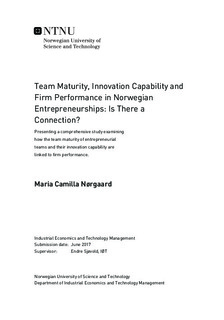Team Maturity, Innovation Capability and Firm Performance in Norwegian Entrepreneurships: Is There a Connection? - Presenting a comprehensive study examining how the team maturity of entrepreneurial teams and their innovation capability are linked to firm performance.
Master thesis
Permanent lenke
http://hdl.handle.net/11250/2468841Utgivelsesdato
2017Metadata
Vis full innførselSamlinger
Sammendrag
The importance of innovative entrepreneurship for sustained economic growth is increasing (IMF, 2017). This is the fundamental motivation for this thesis, in which a study on team maturity, innovation capability, and firm performance in Norwegian entrepreneurships has been performed. The study has contributed with new insight in this area, as well as identifying several interesting elements for further research. Two research questions have guided the study: RQ 1: Is there an effect on firm performance from team maturity and innovation capability in entrepreneurships? And RQ 2: Is there an effect from University Master s programs in entrepreneurship on team maturity, innovation capability and/or firm performance in entrepreneurships?
In sum, it was found that high team maturity in entrepreneurial teams leads to high innovation capability for the entrepreneurship. There was found a more varied degree of support for that high innovation capability leads to high firm performance in entrepreneurships, and that high team maturity leads to high firm performance moderated by innovation capability in entrepreneurships. A positive relationship was found via some methods, however the findings were not consistent across other methods. Further investigation of these relationships in other studies is therefore recommended before any final conclusions can be drawn. Especially, the understanding of firm performance in entrepreneurships should be studied further.
As for RQ2, this study has consistently not found any positive effect on team maturity, innovation capability, or firm performance from the affiliation to a University Master s program for entrepreneurship. It was also found that the entrepreneurships with an affiliation to a University Master s program for entrepreneurship were less inclined to use the team as an arena for innovation than the entrepreneurships without such an affiliation. It is recommended that further research look into these relationships to strengthen the understanding of the causes for these findings.
